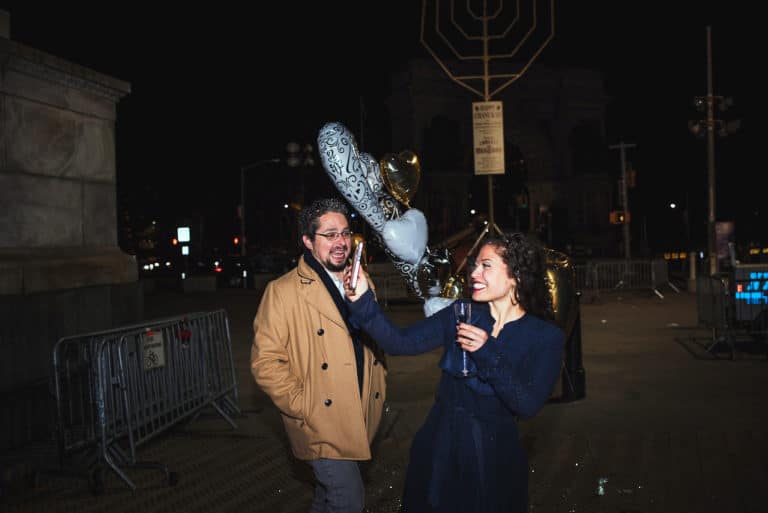
I formally announced my engagement this week. And although this space is usually reserved for more pressing Jewish issues, I am going to take the editorial liberty provided to me as publisher at Unpacked to… well, unpack this a little with you.
Had time to squeeze in one last Hanukkah miracle. pic.twitter.com/ZofHjvdS4I
— Johnny Kunza (@johnkunza) December 5, 2021
Engagements are always special, but in the Jewish world they take on a spiritual status. It’s a religious moment that you share with family, friends and the larger community. Once you’re engaged everything takes on extra meaning and you enter into a different realm.
You take on a new identity. You are no longer half of a couple figuring it out. In my bride-to-be’s community, you become the chassan she the kallah.
If you live in a predominately Jewish neighborhood (as I do) you can’t go half a block without hearing a mazel tov. This morning it came in the form of a drive by – shouted from a scooter weaving through the busy Brooklyn traffic.
My fiance calls it love bombing and it is overwhelming (albeit in a good way). “He who is full of joy is full of love,” as the Baal Shem Tov put it.
And after years of sitting through my fair share of speeches on love, marriage and commitment, I find that it is now my turn to provide my own spin on these old familiar talking points.
So much has been written on this topic. So many have asked the question: what is the Jewish definition of romantic love? Plus, many of our thoughts and feelings on this topic have found their way into the non-Jewish world. All of this combined can give you the feeling that there really isn’t much of anything new to say. Take for example, one of the more popular sayings on love:
“I am my beloved’s, and my beloved is mine…”
Song of Songs 6:3
This saying is used a lot, in fact Victoria Beckham actually has it tattooed on her neck. The more popular interpretations of this verse focus on a couple giving and receiving love– I’m loved and they love me as well. The connecting factor is that the love that you have for each other is being reciprocated.
(Traditionally Jewish scholars interpret the Song of Songs as an allegory for Gd’s love towards us, but I digress.)
In my short d’var Torah I take this a step further.
Till this day we still put so much mysticism, tradition and spirituality into an engagement. In some communities we break a plate to symbolize the seriousness of our commitment to each other. Speeches are made that focus on the spiritual power of a marriage. We give the soon to be married couple brachas and in return they are also given the responsibility of blessing others. We elevate the space around engaged couples into something out of this world.
There’s a good reason for this though. Jokes aside about the overbearing (at times) emphasis on getting married in Jewish culture, there is something extraordinarily special about choosing a life partner. Something the Zohar alludes to:
“A husband and wife are one soul, separated only through their descent to this world. When they are married, they are reunited again.”
The Zohar (I 91a)
Seeing marriage through this lens turns “I am my beloved’s, and my beloved is mine” completely on its head. It’s no longer an equation dependent upon each side balancing out the other, it’s no longer transactional with the expectation of one side reciprocating the other. The Zohar turns this into a constant with each side fixed perfectly in its equalness to the other. Two halves united to form a whole. The power comes from the joining of the sides together.
The family unit is the fundamental building block in Judaism and it takes an extraordinary person to do this with. Such an extraordinary person, that in order to make it work, you need to be cut from the same cloth and be in constant balance with each other.
“Marriage is not just living together, a temporary partnership for mutually beneficial ends. Heaven help us if that is all we see in it. It is the point at which the ‘I’ of self meets the ‘Thou’ of another, transforming us into something larger, more spacious, more generous and tender than we could ever be on our own. In marriage at its best you see humanity at its best, and in a loving home you can almost touch the divine presence,” is how Rabbi Jonathan Sacks put it.
It truly is a blessing to find that person and to realize that they are the other half to your neshama. For me, this is the mysticism and spirituality our traditions are trying to reinforce.
Originally Published Dec 10, 2021 12:02AM EST


